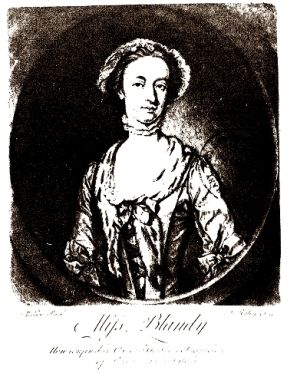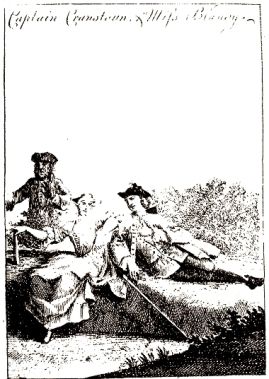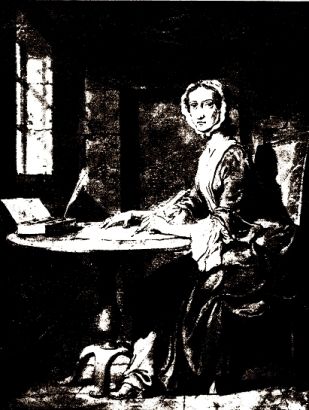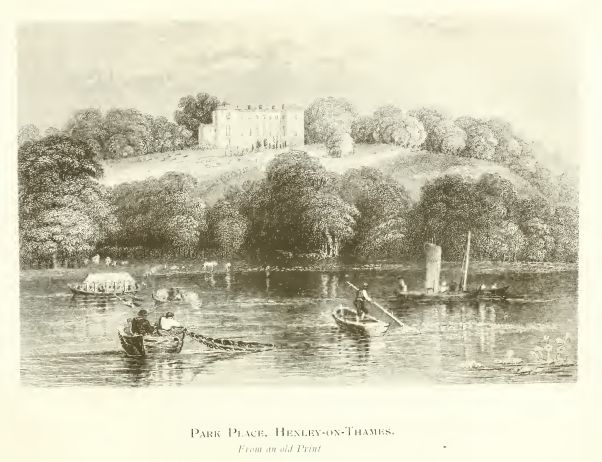Miss Mary Blandy received just the sort of education
suited to an eighteenth century, middle-class lady, furnishing her with all the
refinements, graces and accomplishments society required in one of her station.
She was the only daughter of Mr Francis Blandy, a town clerk and attorney of
Henley-on-Thames, a dour, sharp-witted, social climber whose profession brought
him into the acquaintance of those very people he sought to emulate. Whether it
was true or not, Mr Blandy let it be known thereabouts that he had settled a
dowry of ten thousand pounds on his daughter, something which, inexplicably,
suddenly made her quite an attractive prospect to the young men of the Home
Counties.
 |
| Miss Mary Blandy |
Although she was comely and educated, Miss Blandy bore the marks of
smallpox on her ordinary face, and she had reached the age of twenty-five years
without yet walking down an aisle. Her father and mother had instilled a strong
mercenary caution in her, although it was rumoured that she had developed an
overly strong predilection for the military officers stationed in Henley and
there were no objections raised when she became betrothed to a captain there,
although the prospect of this union faded when he was posted away on service
overseas.
 |
| Miss Blandy and Captain Cranstoun |
Then, in 1746, fate brought another suitor into her life, a
lieutenant of marines, one Honourable William Henry Cranstoun, the fifth son of
the Scottish baron, Lord Cranstoun, and although Miss Blandy blew somewhat cold
in the beginning, she was encouraged by her father, a regular diner with Cranstoun’s
uncle, General Lord Mark Kerr, who had bought his nephew’s commission in the
army for him. So, for Mary, it was off with the old love and on with the new,
her head turned by Cranstoun’s boasts that he was related to at least half of
the royalty or nobility of Scotland.
Friends of the Blandy’s were astonished
when the old lawyer began babbling about ‘my Lord of Crailing’, and his
wife tattled with her gossips about ‘Lady Cranstoun, my daughter’s new mamma’.
The prospect of a title blinded the Blandys, and they seem to
have wilfully ignored the fact that Cranstoun was merely the fifth son of a
financially embarrassed baron. That, and he was forty-six years old,
pockmarked, weedy, weak-eyed, bandy and very nearly a dwarf.
 |
| Miss Mary Blandy |
These inconveniences
became mere irrelevancies, however, when Lord Kerr, concerned for his lawyer
friend and his daughter, wrote a letter to them revealing that his nephew was
already married and was the father of an infant daughter. Cranstoun was already
ahead of the game; he had already intimated to Mary that he was involved in a
lawsuit with a Scottish woman who claimed, illegally, that she was his wife.
In
the mean time, he had written to his wife (who was ignorant of what was going
on in Henley), explaining that his only hope of gaining a valuable promotion
was to convince his superiors that he was a single man, and asking her to write
to him, using her maiden name, and clearing up this inconvenient
being-married-to-her rumour. When her letter arrived, he had copies made and
circulated, which eventually brought him into the courts, where the validity of
his marriage was legally confirmed, when his original letter to his wife
outlining his devious scheme was revealed, and he was ordered to provide an
annuity of forty pounds for his wife and a further ten pounds for the daughter.
Cranstoun’s fortunes faded further when, after the Treacy of Aix-la-Chapelle
which ended the War of the Austrian Succession in 1748, his regiment was
disbanded and he was placed on half pay. Mrs Blandy’s cherished dreams of
chatter with her noble in-laws over the tea-cups in the parlour of Crailing
were slowly withering away and when she passed away soon after, the scales
seemed to fall from his grieving husband’s eyes. He banned his daughter from any
further dealings with the disgraced Cranstoun, but she, blinded by his
flatteries, could only see the errors in the words of those who spoke against
him and secretly continued the affair. By now she was past thirty, the
indignity of spinsterhood was now a distinct possibility and it would only take
a stroke of a pen by her increasingly grouchy father to deny her the ten
thousand pounds.
 |
| Park Place |
Cranstoun met her secretly at Park Place, their normal
trysting-place, before he left Henley for the last time, and he promised to
send her a love philtre which, when introduced into her father’s food, would
cause him to change his mind and sanction their union. This powder, he told
her, would be labelled, ‘Powder, to clean the Scottish Pebbles’,
Scottish pebbles being greatly in fashion as jewellery at the time. Early in
1751, a box of table linen and Scottish pebbles arrived at the house in Henley,
followed some weeks later by another. During the year, the old lawyer’s health
became worse and worse, his clothes hung from his withering limbs, his teeth
began to fall from his gums, and his ill temper grew.
He quarrelled constantly
with his daughter and she quarrelled back, she took to slinking and creeping
around the house. In early June, an old charwoman, Ann Emmett, took Mr Blandy’s
breakfast tray down to the kitchen and drank half a cup of tea that was left on
it. Almost at once, she was seized with a violent sickness and a month later,
the maid-servant Susan Gunnel was taken ill when she, too, finished some tea
that had been prepared for her master. Was the curious ‘powder, to clean the
Scottish pebbles’ something other than a love philtre, maybe?
More Tomorrow
No comments:
Post a Comment